Pushing Forward
February 8, 2018
Hello everyone!
It’s been a while since we have provided an update on Luso Labs - we’ve been busy with our product development and pilot study in India! Supported by the mentorship and capital of Cisco, Columbia University, and VentureWell, we embarked on a new part of our journey by translating our lab prototypes to medical-grade devices, while securing additional funding to help pursue a pilot study. Here are updates on our efforts to eradicate cervical cancer screening worldwide:
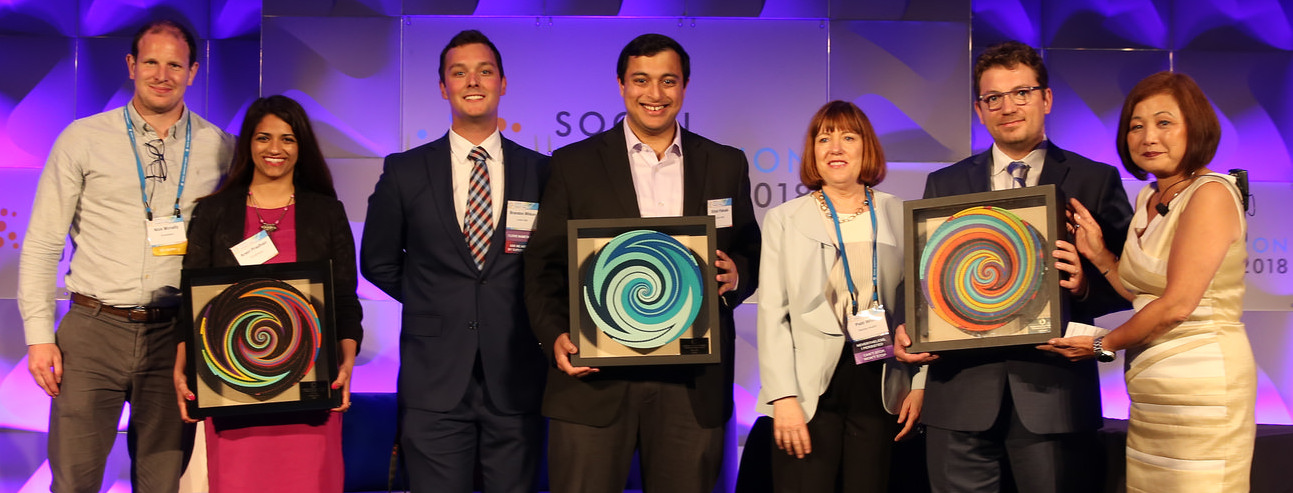
Over the past 18 months, we again found ourselves traveling from city to city for business plan and medical device competitions. Pitching at the 2018 Vodafone Wireless Innovation Project challenge was an enthralling experience; our judges knew our targeted clinical need and proposed technology well and asked deeper questions to understand cerVIA’s barriers of implementation. Fortunately, our time engaging with stakeholders in India and building cerVIA devices in the US gave us the insight needed to answer their questions, and we were able to win 2nd place in their competition with a prize of $200,000. We also received an amazing opportunity to pitch at the 2018 Social Innovation Summit in front of a crowd of ~500 people!
This money has been focused towards developing a medical-grade version of cerVIA. While we had created multiple prototypes, synthesizing the lessons that we learned from each iteration into a medical-grade prototype was harder than we anticipated. It would seem that progressing from one version to the next version of a device means that the second version should inherently be better. While this was true for many features of our prototypes, we also encountered interesting problems with new designs, requiring us to go back to the drawing board. With the hard work of our team of engineers and the assistance of amazing startups like Factor, we were ultimately able to get to a medical-grade device to take to India this past winter.

Our winter trip to India was a time to reconnect with old collaborators and ramp up for a 2019 pilot study. We met again with doctors and administrators from AOGIN India and the Cancer Foundation of India, while also connecting with new friends in Bangalore like Swasti. These conversations have helped us to identify small changes to make to our medical devices for a successful pilot and long-term adoption. We are now hard at work to implement these changes.
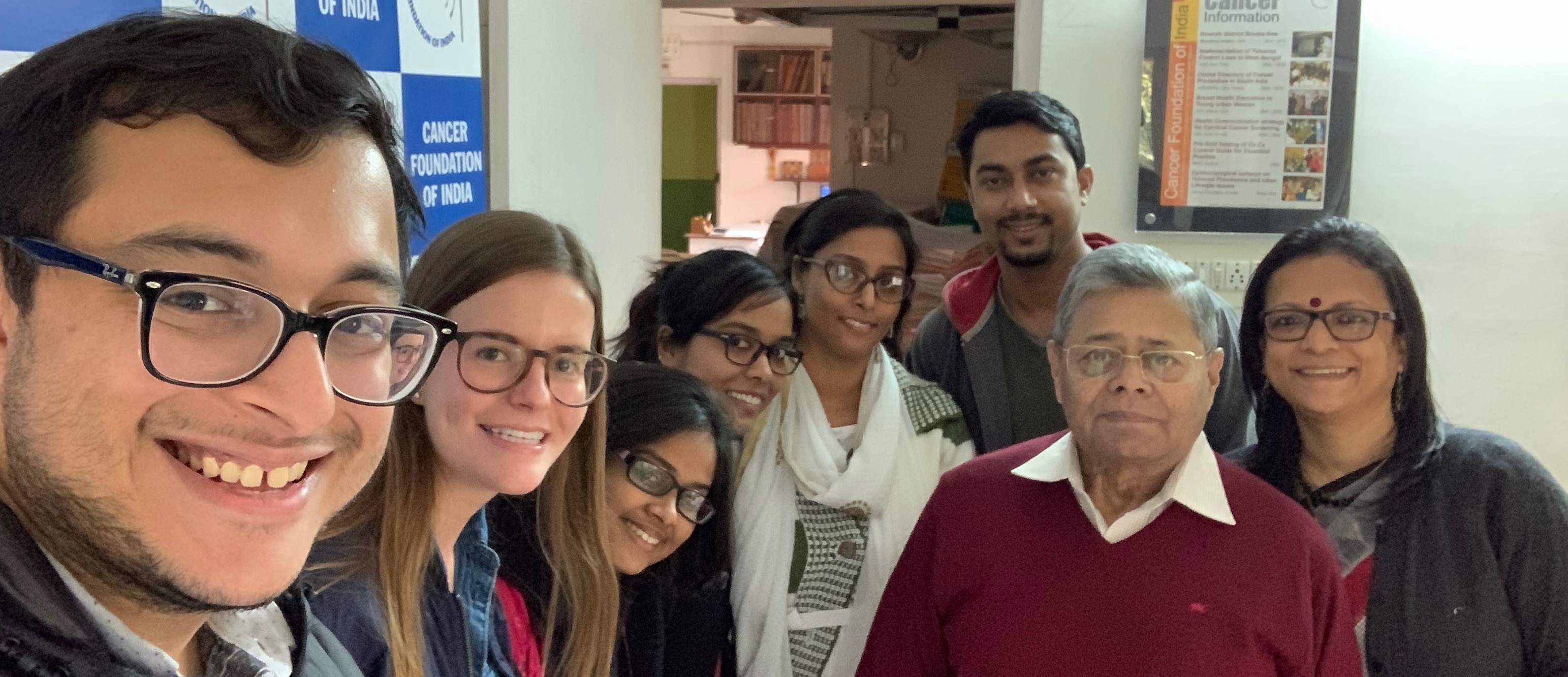
We now have ambitions of a bigger pilot and secondary study for cerVIA that will span from 2019 to 2020. Through our clinical partners, we will be able to test cerVIA in multiple states across India, as well as Bangladesh, allowing us to understand cerVIA’s applicability in many clinical scenarios. Looking ahead, we are putting on the final touches for our medical devices, securing the capital needed for this ambitious clinical study, understanding cervical cancer screening needs through a global survey, and pushing out our pilot over the next 2 years.
With new team members and collaborating organizations like Gabriella Ramil, Julia Kramer, and Visualize, we feel confident in our ability to meet these milestones. As always, our team recognizes the benefits of experience and actively seeks mentorship. Anyone interested in helping our cause can click the "Contact Us" button above.
Until next time,
Ritish Patnaik and the Luso Labs Team
Making Strides
August 7, 2017
Hello everyone!
It’s been a little over a year since we started Luso Labs. Since we transitioned from a senior design project to a small startup, our team has learned first-hand about the many challenges that lie in commercializing a global health technology. Making an impact in low and middle-income countries is not easy. Oftentimes, they lack the medical procurement and reimbursement infrastructures that we find in the United States, and developing a low-cost, adaptable technology that meets the needs of clinicians, patients and public health officials alike has proven to be difficult. Nevertheless, we continue to be determined in our mission and are happy to share some updates on how our team has been working towards eradicating cervical cancer around the world.
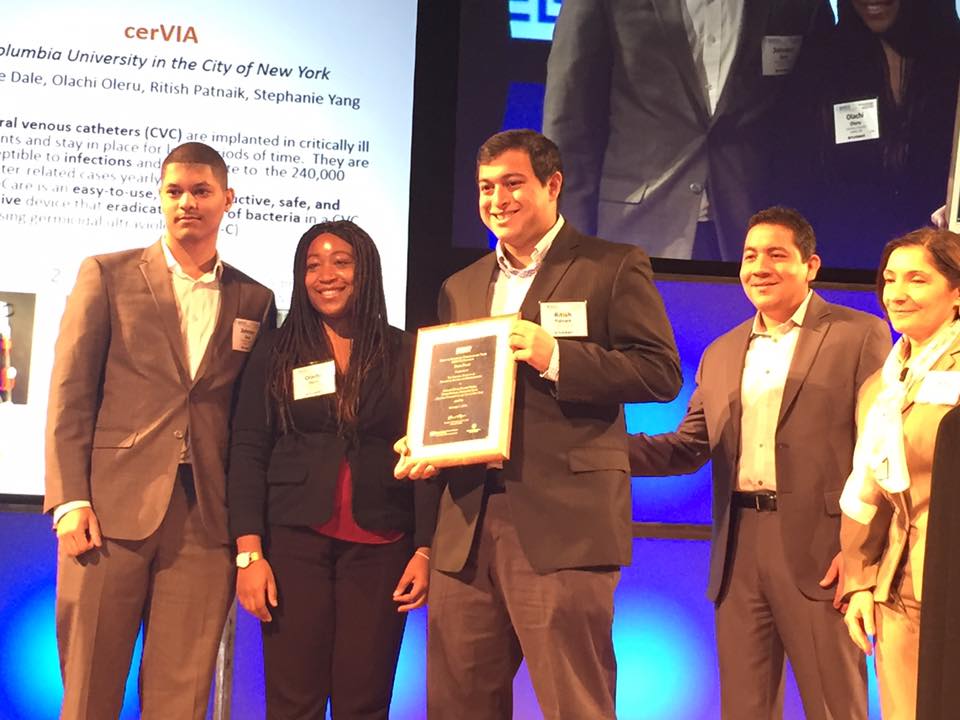
We found ourselves flying from city to city for business plan and medical device competitions near the end of last year. We were very fortunate to compete in the Undergraduate Design Competition at the 2016 BMES Annual Meeting in Minnesota. This was our first time competing against medical device projects from other schools, and we were able to place second in the competition, while also winning third place in the NIH-NIBIB DEBUT competition. A little over a month later, our team traveled to Washington D.C., where we met with other aspiring entrepreneurs in the Collegiate Inventors Competition. Distinguished engineers like Steve Sasson, the inventor of the digital camera, provided valuable feedback on our product, and we came away from the competition with a better understanding of how we should continue developing our technology.
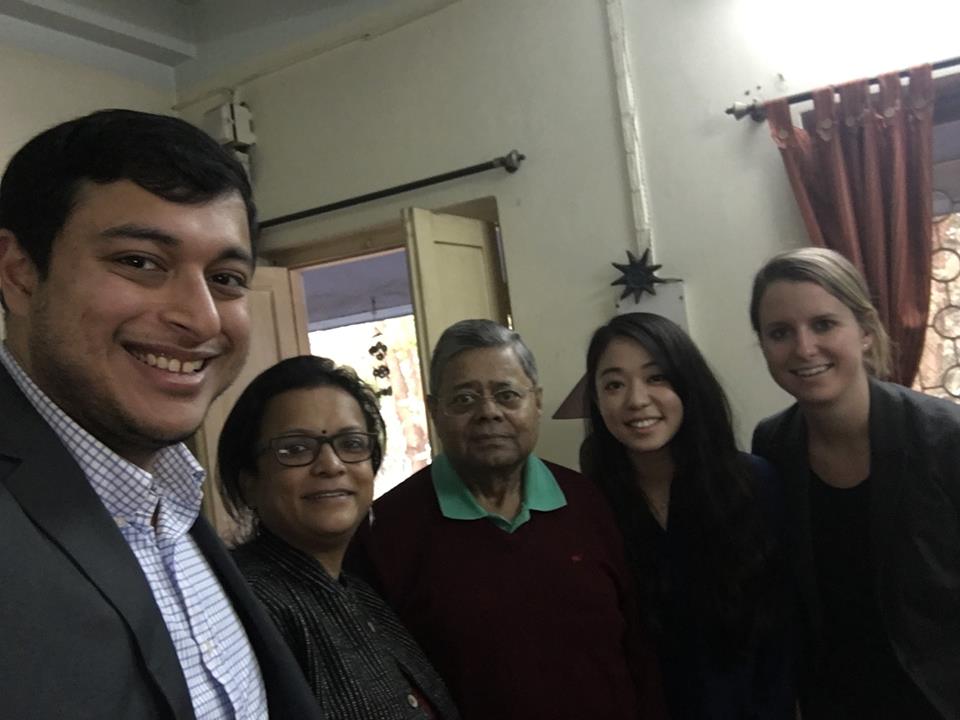
This information proved vital in our Winter trip to India, where we got feedback from partner NGOs on our technology and commercialization strategy while also starting discussions on a pilot study partnership for this coming Winter. Stephanie, Katie and Ritish had the opportunity to meet with doctors and administrators from the Cancer Foundation of India, Suyosha at Maxcure, Biocon Foundation and AOGIN India. Having strengthened these relationships since our initial visit, we are excited to meet with these partners again during this coming Winter trip and begin our pilot study.
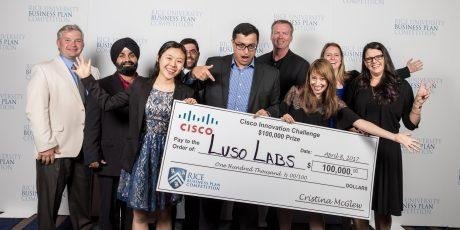
The past spring was largely focused on fundraising, as our team ventured across the United States to participate in business plan competitions. From our Winter trip in India, we came to understand the vast amount of capital required to conduct a pilot study in India, and our team determined that the best way for us to complete such a study was through non-dilutive funding. Fortunately, we were able to raise ~$135,000 after being awarded a Stage 2 grant from VentureWell and winning second place in the Global Health Technology track of the 2017 Columbia Venture Competition. Our most significant backer and partner has been Cisco, who awarded us with their Innovation Challenge award at the 2017 Rice Business Plan Competition. We are extremely excited to be working with Cisco and leveraging their infrastructure in India to bring cerVIA to the market.
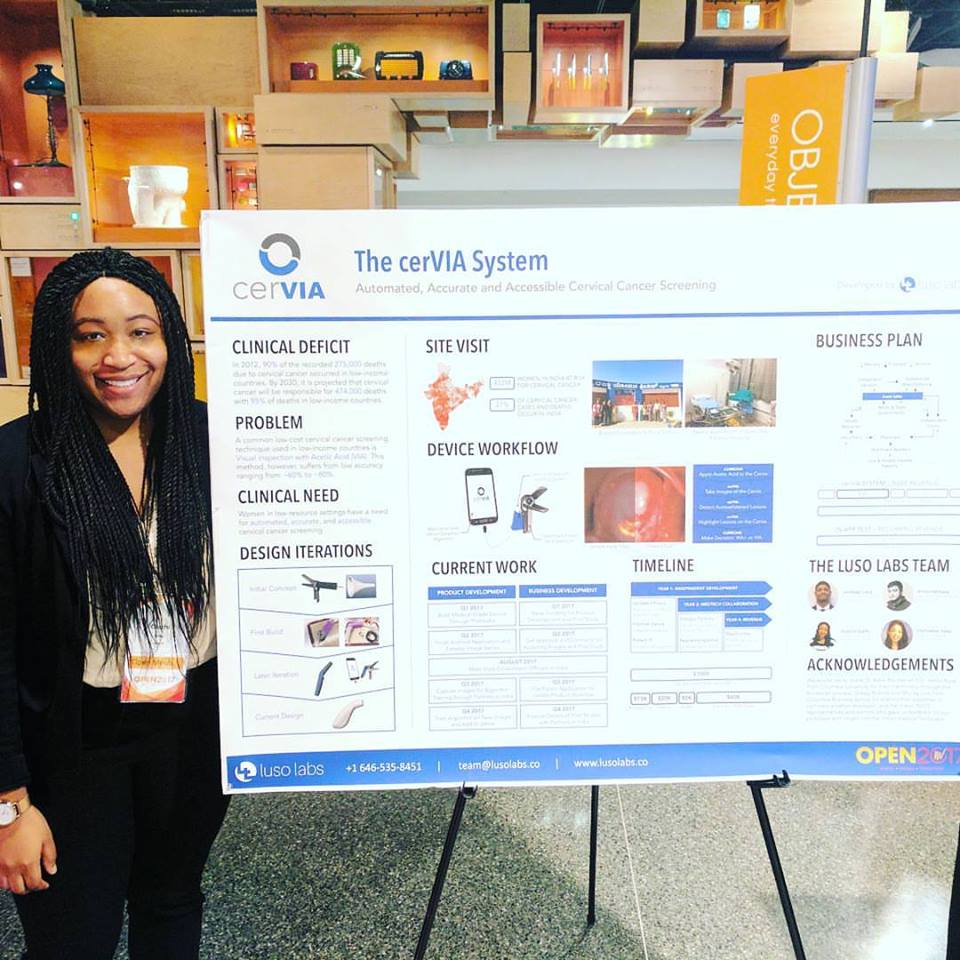
With enough money for prototyping, we refocused our efforts on product development this past summer, making huge strides in improving our prototype. Before the summer began, Cameron Statton, Brandon Wilson and Riancy Li joined our team; their contributions over the past few weeks have helped accelerate our product development.
Looking ahead, we will have our medical-grade prototypes completed by the end of 2018 and will bring these devices to India in our winter trip to begin our pilot study collaborations with our partners. Our team would like to give a special shout-out to our mentors, Professor Katherine Reuther, Mr. Gregg Rivkind and Professor Aaron Kyle, for their thoughtful discussions and encouragement over the past year to help accelerate Luso Labs. Our team recognizes the benefits of experience and actively seeks mentorship. Anyone interested in helping our cause can click the "Contact Us" button above.
Until next time,
Ritish Patnaik and the Luso Labs Team
Senior Design to Start-Up
June 20, 2016
Hello everyone!
We are excited to announce the launch of Luso Labs LLC! Through the cerVIA system, Luso Labs will help provide automated, accurate and accessible cervical cancer screening for clinics and hospitals in low and middle-income countries (LMICs) worldwide. This journey began a little more than a year ago when our team came together with the goal of developing revolutionary medical technologies that meet the unique clinical needs in LMICs. To do so, our team went through the Columbia Biomedical Engineering Design Program in the fall of 2015. We used principles created by the Stanford Biodesign Institute to identify a clinical need, determine pertinent design inputs, evaluate potential solutions and perform proof-of-concept testing. Through this process, we found ourselves engaged with the idea of improving the visual inspection with acetic acid (VIA) testing that is used for cervical cancer screening in LMICs. Our team began developing the cerVIA system: a speculum-fitted device that uses a unique algorithm to detect precancerous lesions found during VIA.
 Olachi Modifying an Early Camera System Prototype in the Columbia Biomedical Engineering Design Lab
Olachi Modifying an Early Camera System Prototype in the Columbia Biomedical Engineering Design Lab
With promising proof-of-concept testing results from our initial prototype, our team now looked to understand the needs of our customers in LMICs and further detail out our business model. Before the spring semester started, we took part in the Lean Launchpad program led by Steve Blank in the Columbia Business School. By pushing us to interview ~60 key stakeholders in the LMIC cervical cancer screening market in the span of five days, Lean Launchpad opened our eyes to the clinical resource constraints that our customers faced. Coming away from the program, our team had the insight needed to develop a viable business model.
 The Luso Labs Team with Columbia College Dean James Valentini at the 2016 Columbia Venture Competition
The Luso Labs Team with Columbia College Dean James Valentini at the 2016 Columbia Venture Competition
During the spring semester, Columbia Business School’s Innovation and Entrepreneurship Program (IE@Columbia) provided our team with the platform to completely flesh out our business model. By interacting with a cohort of ~20 professors and 8 other start-ups in weekly classes, our team leveraged the decades of experience in our classroom to identify our target market, existing distribution channels and regulatory processes while building our financial projections and pricing strategy. While constructing our business model, we still worked hard in the lab, finishing preliminary prototyping of the cerVIA system in our design program. This combination of effort and focus on both the business and technology aspects of our start-up ultimately helped us to win significant funding at the 2016 Columbia Senior Design Competition and Columbia Venture Competition, providing the capital needed to start Luso Labs LLC.
 Stephanie, Olachi and Ritish with Columbia Engineering Dean Mary Boyce at the 2016 Columbia Senior Design Exhibition
Stephanie, Olachi and Ritish with Columbia Engineering Dean Mary Boyce at the 2016 Columbia Senior Design Exhibition
Luso Labs’s vision is for a world without the threat of cervical cancer. We want to supplement the accuracy of current VIA testing and save hundreds of thousands of women from cervical cancer every year. During the summer, our team will be continuing to optimize the cerVIA system's algorithm while also organizing our pilot study in India. We'll also be doing some traveling in the next few months: Cambridge in late-July for the VentureWell E-Team Stage 1 Workshop and Kampala, Uganda in mid-August for field-testing. Reach out to us if you are in the area and want to meet!
Looking back, we have greatly benefited from the help of our professional mentors. Our team recognizes the benefits of experience and actively seeks mentorship. Anyone interested in helping our cause can click the "Contact Us" button above. Through your support, we will make Luso Labs's vision into a reality.
In the meantime, stay tuned for our periodic progress updates. We are very excited to have you join us on our journey.
Until next time,
Ritish Patnaik and the Luso Labs Team
Let's start talking
With a goal to reach patients within 3 years, our team welcomes feedback, collaborations and funding opportunities.










